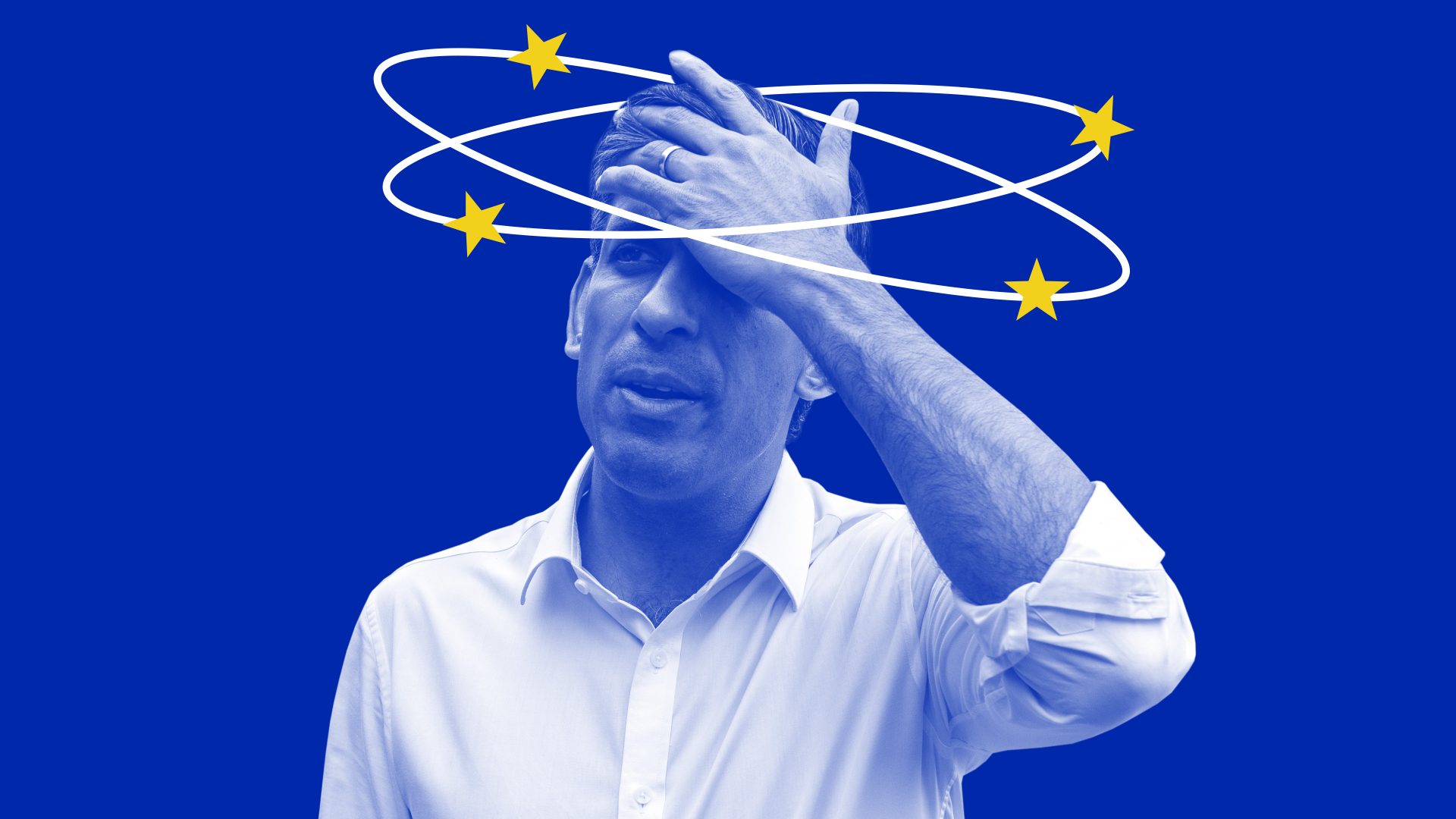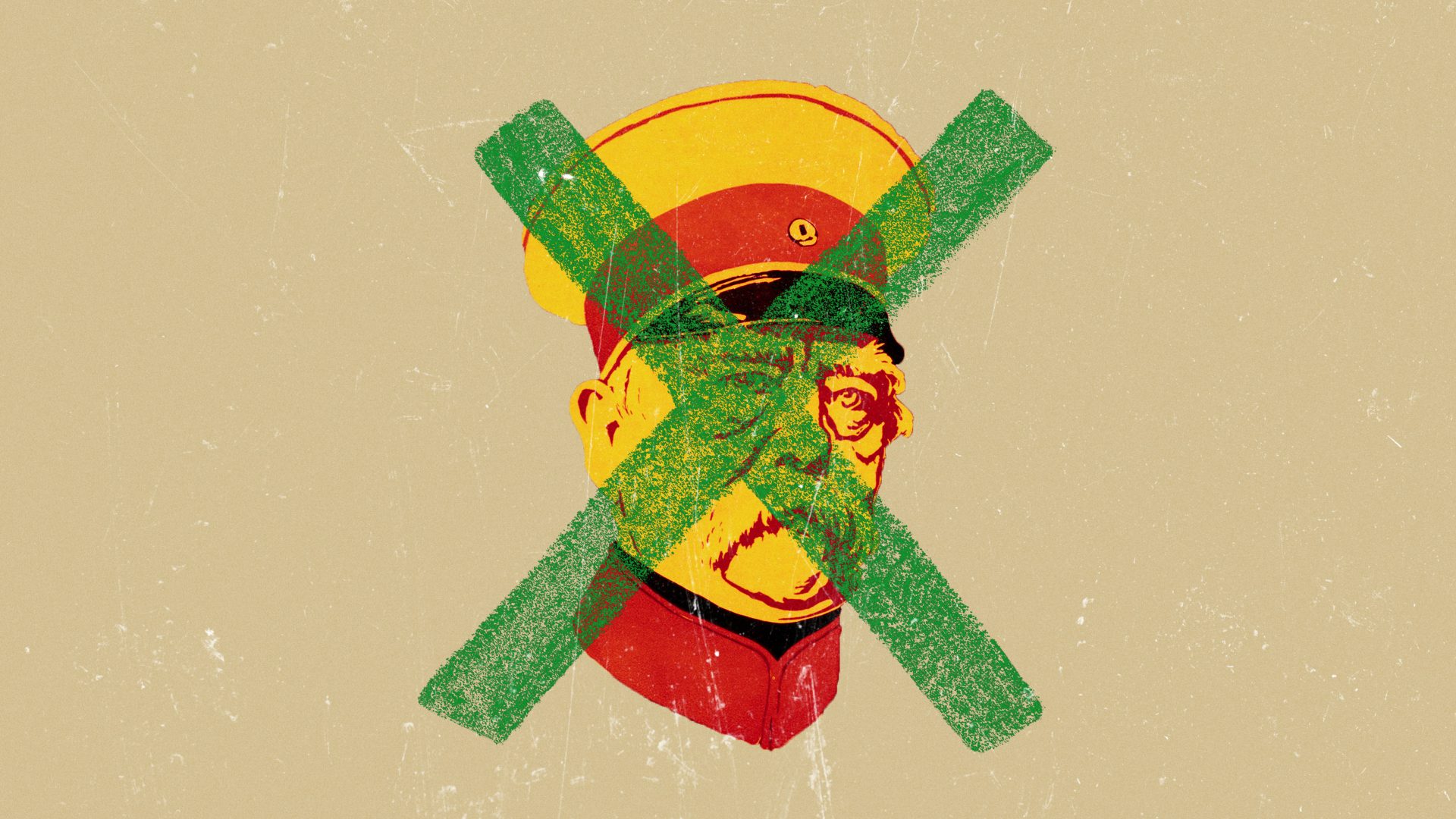Lasers are generally thought to be precise, powerful and specific – the very opposite of the scattergun approach deployed by various UK administrations since 2016 when negotiating around Brexit. So when foreign secretary James Cleverly declared last week that “we remain laser-focused on finding a solution that works for the people of Northern Ireland,” the reaction in Brussels was bemusement mixed with scepticism.
“Laser-focused” is certainly not how Westminster has looked from here. Even now a new deal has been reached over trade across the Irish border, there are still concerns that Cleverly’s laser could be seized by Brexiteers and Unionists who are determined to use it to erase the whole thing – over the next few days, or later should bad results in May’s local elections put Rishi Sunak’s position in jeopardy.
On Monday, a week later than billed, the prime minister and European Commission president Ursula von der Leyen revealed their agreement at a press conference in Windsor. After that, in an act of symbolism, von der Leyen had tea with the King. This created howls of protest from Jacob Rees-Mogg, spiritual leader of the European Research Group.
It’s not the first time No 10 has reached an agreement with Brussels – as Theresa May will painfully remember. Now Brussels is waiting, warily, to see whether Sunak can sell his deal in Belfast and Westminster.
The German MEP David McAllister, chair of the influential committee on foreign affairs, points out that the deal now “has to be put into practice,” adding that “the governments of Mr Johnson and Ms Truss gambled away a lot of trust in this regard.”
But at least Sunak has helped Brussels put its Brexit fatigue aside for a while. He dashed across Europe for meetings with EU leaders, giving a sense that something could be achieved. Talks happened and concessions were made, something that was not the case under the two previous prime ministers. But the closer Sunak got to a deal, the more the lunatic fringes of his own party seemed determined to stop him.
What happens next “depends critically on Sunak’s own character,” said Nicholas Whyte, Brussels consultant and visiting professor at Ulster University. “It’s quite difficult to see him getting this through and at the same time keeping (the whole of) his party intact.”
When detail of the deal finally came, it was much along the lines of what had been leaked in Westminster beforehand in an attempt to win over the awkward squad. The red lane/green lane system for goods crossing the Irish sea was a pragmatic solution that most on both sides agreed could work. Northern Ireland’s VAT and state aid policy being set only in Westminster was a shift designed to get the DUP on board.
But the real sticking points for Unionists in NI and Brexiteers on the UK mainland remain the role of the Court of Justice of the EU (CJEU) – which is being fudged, but not scrapped – and the future of Johnson’s Northern Ireland Protocol Bill that would have allowed London to unilaterally rip up any deal.
The EU succeeded in getting Sunak to remove the Bill from the table. European Commission officials privately say they are in “wait and see” mode as to what happens next.
Other EU diplomats believe Sunak learned from Johnson’s mistakes in creating what was described as a “poisonous” relationship between the EU and UK. “There isn’t a way to divide and conquer the EU on this issue,” said one. “The EU has stuck together on this for years. Sunak seems to have understood that dealing exclusively with the EU Commission rather than approaching national capitals is the best move. In that sense, the approach of this UK government is markedly different from anything we’ve seen before.”
Yet there is still one eye open on part of Johnson’s legacy. “With a healthy degree of scepticism, we in the European Union will watch closely whether the controversial Northern Ireland Protocol Bill will actually be dropped,” McAllister added.
The involvement of Johnson, then and now, is still seen as hugely damaging in Brussels. First, he harrumphed that the deadlock-breaking agreement he signed shortly after becoming PM was only a rushed first draft, enraging those in the EU who had painstakingly assembled it with him and David Frost. “From the Brussels perspective, a deal was arranged and agreed and signed. But then it turned out that Boris Johnson wanted to go back on it for personal electoral purposes – and Liz Truss even more so,” said Whyte.
Irish MEP Sean Kelly was also scathing: “Either former prime minister Johnson did not know what he was agreeing to, or he made his own personal power-hungry political calculus to close his eyes and sign on the dotted line knowing his public and private promises held no water.”
Then, in recent days, Johnson’s calls on Sunak to maintain the Protocol Bill as “leverage” over the EU were particularly badly received in Brussels. The thought that its demise may be used by Johnson to launch another comeback attempt produces eye-rolling and nervousness in equal measure.
Although Kelly admitted that the atmosphere in negotiations was “much more positive and pragmatic” since Sunak took office, he said he was concerned that “key stakeholders in Northern Ireland were not updated and consulted throughout the negotiations by the UK government, this in part contributed to the tension we see with political unionism.”
In an effort to give the EU some of the same “leverage,” MEPs had voted to empower the European Commission to adopt trade retaliation measures should the UK breach its obligations under post-Brexit agreements, including the Protocol.
According to Whyte, the complexities of the Northern Ireland situation are understood to an extent, but the need to keep the Irish border open seems not to have dawned on the hardline side of the UK – “certainly not from the DUP or from the hardline Conservatives.”
The EU is no stranger to small regions almost torpedoing international trade deals. In 2016, the small Belgian region of Wallonia refused to back the controversial CETA deal with Canada until concessions were made. But the intransigence of the DUP is viewed with frustration from Brussels. Whyte described the failure to get the DUP on board before the deal was done as one of the “limitations of the British internal negotiation approach.”
Inside the EU, everything has to be signed off and agreed by all 27 member states, so the commission doesn’t move very far without a very strong sense of where the national capitals are prepared to go.
“One gets the sense that this internal stakeholder consultation isn’t happening on the British side at all. With the result that the proposals didn’t enjoy the confidence of all of the people that Sunak would have needed to keep on board. So I think that’s part of what we’re seeing: that the less consensual approach within the UK is leading now to difficulties when it comes to actually getting anything over the line,” said Whyte.
The rhetoric adopted by some hardline Tories in the past has alienated the EU side and means that there is far from complete trust that any new deal will be honoured. Warlike language regarding “surrendering to Brussels” has created the widely held view that some would rather play to the gallery back home than create a win for everybody.
The best-case scenario is that those voices are, finally, silenced and that calm pragmatism reigns at last, allowing further progress on things like the Horizon science research programme. But in a worst-case scenario in which painstaking bridge-building is torpedoed by a combination of Mark Francois and Jeffrey Donaldson, Whyte said that we could “end up lurching along as we are, with the atmosphere between Westminster and Brussels getting steadily more and more poisonous. And eventually, we will have a Labour government in the UK which will have a top priority to clear the decks. It’s difficult to imagine that Labour could do a worse job.”
The EU would like Sunak’s deal approved quickly. Ireland’s junior minister with responsibility for European affairs, Peter Burke, said there was a very narrow window of opportunity for a resolution, adding that it was time to get back to other business at hand, rather than letting Brexit dominate minds again.
Despite all the frustrations involved about Britain never being entirely sure of what it wants, most EU insiders just want to forget about Brexit and get on with the business at hand – war in Ukraine, soaring energy costs and the climate crisis. As one put it: “No one in Brussels cares anymore, apart from the people who have to because it’s their job.”
Jennifer Baker is a journalist based in Brussels



